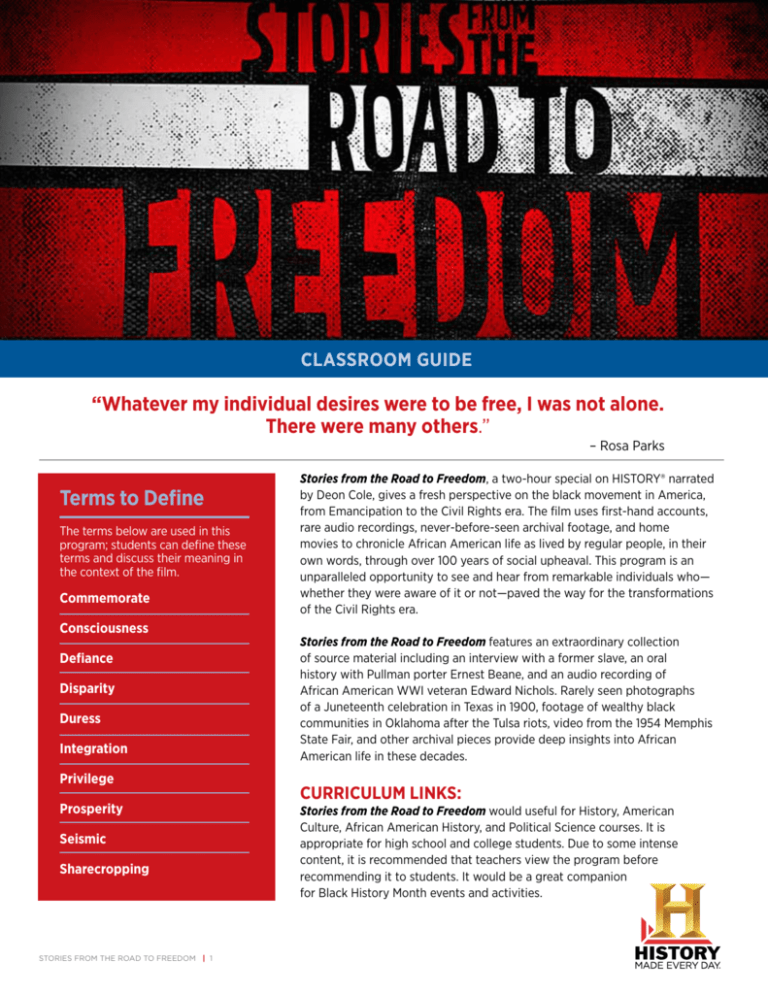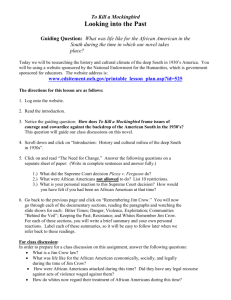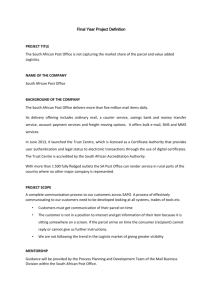
Classroom Guide
“Whatever my individual desires were to be free, I was not alone.
There were many others.”
– Rosa Parks
Terms to Define
The terms below are used in this
program; students can define these
terms and discuss their meaning in
the context of the film.
Commemorate
Consciousness
Defiance
Disparity
Duress
Integration
Privilege
Prosperity
Seismic
Sharecropping
Stories from the Road to Freedom, a two-hour special on HISTORY® narrated
by Deon Cole, gives a fresh perspective on the black movement in America,
from Emancipation to the Civil Rights era. The film uses first-hand accounts,
rare audio recordings, never-before-seen archival footage, and home
movies to chronicle African American life as lived by regular people, in their
own words, through over 100 years of social upheaval. This program is an
unparalleled opportunity to see and hear from remarkable individuals who—
whether they were aware of it or not—paved the way for the transformations
of the Civil Rights era.
Stories from the Road to Freedom features an extraordinary collection
of source material including an interview with a former slave, an oral
history with Pullman porter Ernest Beane, and an audio recording of
African American WWI veteran Edward Nichols. Rarely seen photographs
of a Juneteenth celebration in Texas in 1900, footage of wealthy black
communities in Oklahoma after the Tulsa riots, video from the 1954 Memphis
State Fair, and other archival pieces provide deep insights into African
American life in these decades.
Curriculum Links:
Stories from the Road to Freedom would useful for History, American
Culture, African American History, and Political Science courses. It is
appropriate for high school and college students. Due to some intense
content, it is recommended that teachers view the program before
recommending it to students. It would be a great companion
for Black History Month events and activities.
STORIES FROM THE ROAD TO FREEDOM | 1
Protestors at the March on Washington in August 1963
Stories from the Road to Freedom
discussion questions
1. This program explores life for African Americans in “Jim Crow” America. What is the
definition of Jim Crow and how was it experienced by the people in this film? Research
this term to inform your discussion and give some specific examples.
2. How does H.J. Williams describe the reality of life as a sharecropper? Why do you think
sharecropping developed after the Civil War?
3. In the decades after the Civil War, many local laws, known as “Black Codes” limited the
rights of African Americans. How do you think restricting the ability of African Americans
to vote affected their communities during these years?
4. What was “Juneteenth” and what was the significance of Juneteenth celebrations for
African Americans?
5. D
espite the intense racism and discrimination they faced, tens of thousands of African
Americans enlisted as soldiers during World War I. Why do you think they enlisted?
6. What was life like for African American Pullman porters? What were the positive and
negative aspects of this profession?
7. How did African Americans who served in World War II featured in this film describe their
experiences? How did African American veterans help spark the Civil Rights Movement?
8. What are some of the reasons African Americans left the South and moved to Northern
cities? What are some examples from this film of African American experiences in
the North?
9. How did the Brown v. the Board of Education Supreme Court case change American
society? Given this landmark decision, why do you think it took so long for school
desegregation to take place?
10. What was the story behind the Loving v. Virginia Supreme Court case?
What was the outcome?
STORIES FROM THE ROAD TO FREEDOM | 2
©2013 A&E Television Networks, LLC. All rights reserved. 0141.
“Our lives begin to end
the day we become silent
about things that matter.”
– Martin Luther King, Jr.
Dr. Martin Luther King, Jr. mobilizes the Civil Rights Movement.
Stories from the Road to Freedom
Activities
1. Civil War to Civil Rights: A Timeline. This film touches upon many key events in the post-Civil War struggle for Civil Rights,
from the passage of the 13th Amendment through the 1964 Civil Rights Act. Working individually or in small groups, create a
timeline of key Civil Rights-related events from this time period. Students can include short descriptions of each event with their
timelines. It is important to think broadly and include events related to immigration restrictions, women’s rights, etc
2. Plessy v. Ferguson. The landmark 1896 Supreme Court decision Plessy v. Ferguson solidified policies of “separate but equal” in
American society. Visit NARA’s Our Documents site to read about this case at www.ourdocuments.gov/doc.php?doc=52. Then,
write a short synopsis of case, the Supreme Court’s decision, and its influence on American society.
3. The New Negro Movement. This film explores the Harlem Renaissance and the concept of the “New Negro” described by Alain
Locke and others. Visit this Library of Congress online exhibition: myloc.gov/Exhibitions/naacp/newnegromovement. Students
can choose one of the related documents on this site to describe, or read passages from the book The New Negro (1925) edited
by Alain Locke. What does this term mean? What role did women play in this movement?
4. Road to Civil Rights. This film mentions many important events in the Civil Rights Movement, from the Montgomery Bus
Boycotts to the lunch counter sit-ins to the march in Selma. Choose one of these events and research the background, tactics
used, and organizations involved. Then, create a poster, newspaper article, or radio report about the event.
BOOKS
Du Bois, W.E.B. The Souls of Black Folk. (Tribeca Books,
2013). (Originally published in 1903)
Hunter, Tera. To ‘Joy My Freedom: Southern Black
Women’s Lives and Labors after the Civil War. (Harvard
University Press, 1998).
Holloway, Jonathan. Confronting the Veil: Abram Harris
Jr., E. Franklin Frazier, and Ralph Bunche, 1919-1941.
(University of North Carolina Press, 2001).
Kelley, Robin D.G. and Earl Lewis. To Make Our World
Anew: Volume II: A History of African Americans Since
1880. (Oxford University Press, 2005).
Woodward, C. Vann. The Strange Career of Jim Crow.
(Oxford University Press, Commemorative edition, 2001).
(Originally published in 1955).
STORIES FROM THE ROAD TO FREEDOM | 3
WEBSITES
History.com: Black History Resources
www.history.com/topics/black-history-month
Bio.com: African American history site
www.biography.com/people/groups/
black-history
Smithsonian National Museum of American
History: Brown v. Board of Education
americanhistory.si.edu/brown
National Park Service: Civil War to Civil Rights
www.nps.gov/civilwar/civil-war-to-civil-rights.htm









